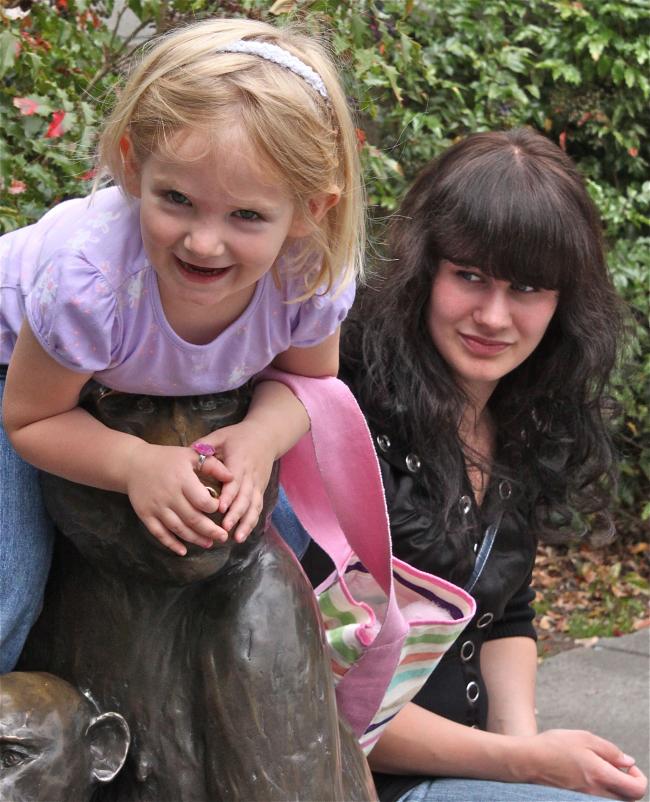Au Pairs are increasingly popular for child care
Payton Groteluschen with the family au pair, Anne-Maria Liisanantti at Woodland Park Zoo.
Mon, 07/05/2010
by Katie Joy
Life with the Grotelueschen family never stops moving. Keeping up with two young children, 5-year-old Payton and 2-year-old Noah, is a full time job, not to mention Topher, the family’s energetic black lab.
Add getting to pre-school on time, keeping up with careers and the occasional needed date night with just the parents and accessible child care becomes a pressing issue for many families.
In 2009, the median rate for child care centers in King County totaled $1,235 a month, according to the Washington State Child Care Resource and Referral Network.
In the northwest, au pairs are catching on as an alternate form of child care, often more affordable and convenient than the high rates and hassle of day care centers or even local nannies.
The Grotelueschen family’s first au pair, Anne-Maria Liisanantti, arrived in Seattle on July 10, 2009. After spending the year living with the family, assisting with child care responsibilities and absorbing life in Seattle, Liisanantti will return to Finland on July 7.
“She does everything,“ laughed Beth Grotelueschen, a mother of two and real estate agent. “She’s like a surrogate mother.”
The Grotelueschen’s recently entered a national video contest through Child Care Au Pair. If they win, the family would receive a program fee waiver – totaling over $7,000 – for their next au pair. So far, they are the only Seattle entry.
According to its website, Cultural Care Au Pair has placed more than 75,000 au pairs in American homes since 1989.
“In Seattle, we just seem to be growing and growing and growing,” said Krista Rietberg, a local child care coordinator for Cultural Care Au Pair.
Many au pairs interested in coming to live in the United States know about New York and California. However, Seattle was not initially on the map, until Grey’s Anatomy, laughed Rietberg.
Rietberg works with 15 families in West Seattle, acting as a liaison between families, au pairs and the agency. Between the 11 or 12 local coordinators, Rietberg estimated that Cultural Care matches about 200 families with au pairs in the Seattle area.
“It’s been great for us,” Beth Groteluschen said. “Speaking for us personally it’s been absolutely perfect for the year. It’s been exactly what we needed, and now we have plans to visit Finland someday.”
Having a live-in au pair afforded the Grotelueschen’s more flexibility rather than orchestrating day care.
“If the kids are ever sick or couldn’t go to school, we usually have to scramble to see, OK, who’s going to take off work,” Beth Grosteluschen said.
With Liisanantti there, Beth and Jason Grotelueschen had an extra set of hands to depend on when they needed them.
Au pairs are also affordable, Reitberg said.
“It seems like something for someone with a very high income,” she said. In reality, au pairs are affordable and offer families a heightened level of flexibility and peace of mind.
Reitberg explained that with an au pair, a family pays $340 a week, not per child. Often with day care or nanny services, the cost goes up with more children. A downtown child care center could charge $1,500 per month for one child, she said.
“If you have more than one kid, for sure, it’s less expensive than sending them to day care,” Beth Groteluschen said.
The Grotelueschen’s first considered hiring an au pair in February 2009 after hearing about Cultural Care Au Pair from a friend of a friend. They set up a meeting with Rietberg to discuss the costs and benefits.
“We thought that it made a whole lot of sense for child care solutions,” Jason Grotelueschen said.
Given tighter budgets in the current economy, more families are turning to au pairs to meet their child care needs, Reitberg said.
“I always tell families they don’t need a big house or extra car,” she continued.
What au pairs are looking for is experiencing life with an American family.
Often families are nervous about having someone unknown in their house, but the bigger leap of faith is on the au pair's part. They are leaving everything familiar, Rietberg said.
Currently, the Reitberg’s are hosting an au pair from Argentina, which means her three children are constantly decked out in Argentinean football gear, she laughed. Before, the Reitberg family had au pairs from Brazil and Thailand.
“I like the cultural aspect,” Beth Grotelueschen echoed. As a student, she also studied in Spain and lived with a host family. “I thought it would be a cool thing to host someone.”
Cultural Care Au Pair is a U.S. Department of State regulated program. Au pairs must have their own private bedroom, are placed in homes where English is the primary spoken language and cannot work more than 10 hours a day or 45 hours a week.
Liisanantti said she applied through Cultural Care because she wanted to particapte in an exchange program when she was younger. Even though she had homesick moments, Lissanantti has found her place in the Grotelueschen family.
“Now I’m going back in two weeks, and I’m like I don’t want to go!” she said.
Reitberg said the Grotelueschen’s have a good chance of winning the video contest and potentially a second au pair without the program fee, although the $195 stipend would still be paid to the au pair.
The winner is determined by public votes, through this site http://contest.culturalcare.com/ which will be accepted until July 15, she said.
“We just made a little video and it was just ‘OK, everybody sit down we’re making a video,’” Beth Grotelueschen laughed.
Their video can be found here.


